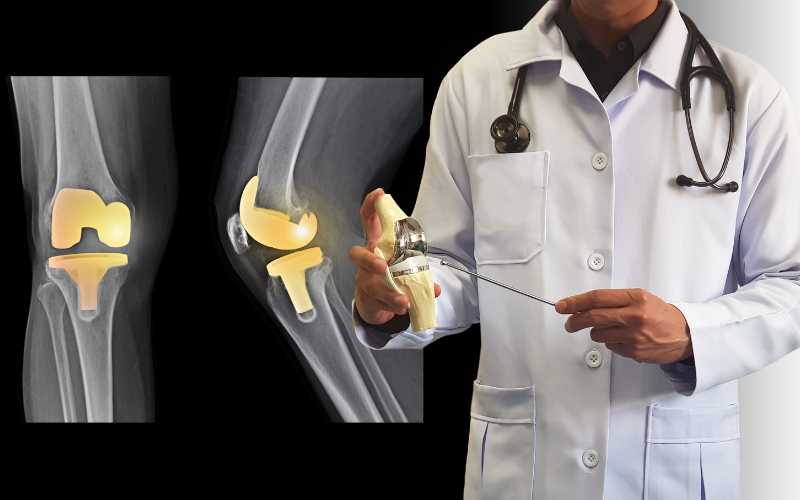Partial Knee Replacement Surgery
Knoxville’s Best Choice for Partial Knee Replacement Surgery in Eastern Tennessee
Our Specialty
What is a Partial Knee Replacement?
In a partial knee replacement, also called unicompartmental knee replacement, only a small part of the knee is replaced. If the disease is only in one part of the knee, this procedure can be done instead of a total knee replacement.
Since a partial knee replacement is done through a smaller incision, patients usually don’t have to stay in the hospital. They can get back to normal activities sooner than those who have a total knee replacement.
ADVANTAGES OF A PARTIAL KNEE REPLACEMENT
Partial knee replacement works well for most people who are good candidates for it. A partial knee replacement is typically a better option than a total knee replacement because:
- Faster healing
- Surgery will hurt less.
- Less bleeding
- Less chance of getting sick and getting blood clots
- Can potentially bend better than a total knee replacement
- Feels more natural than a total knee replacement
WHO IS A GOOD CANDIDATE FOR A PARTIAL KNEE REPLACEMENT?
If you have advanced osteoarthritis and nonsurgical treatments are no longer helping your pain, your doctor may suggest getting a knee replacement.
To be a good candidate for a partial knee replacement, you must only have arthritis in one part of your knee.
You might not be able to get the procedure if you have any of the following:
- Inflammatory arthritis
- Very stiff knees
- Ligament damage
PARTIAL KNEE REPLACEMENT PROCEDURE
The process is broken down into three main steps:
- Get the bone ready – Your doctor will use special saws to cut the cartilage out of the part of your knee that is damaged
- The size of your bones will be measured and positioned for the metal implants – The surgeon replaces the cartilage and bone that were taken out with metal coverings that make the joint surface look like it did before. Most of the time, cement holds these metal pieces to the bone. On the other hand, in cementless fixation, the metal parts can be pressed onto the bone to let the bone grow onto the implant
- Put a spacer in – The surgeon puts a piece of plastic in between the two metal parts to make a smooth surface for sliding
PARTIAL KNEE REPLACEMENT RECOVERY
Patients who have a partial knee replacement usually have less pain and swelling after the surgery and an easier time getting back to normal than those who have a total knee replacement.
After surgery, you will start putting weight on your knee right away. You might need a walker, cane, or crutches for the first few days or weeks until you get used to walking without help.
A physical therapist will give you exercises to help you keep your strength and range of motion. Most likely, by 6 weeks after surgery, you will be able to do all of the things you normally do.

PARTIAL KNEE REPLACEMENT WITH TOA
If you are struggling with knee arthritis or other condition and may need a partial knee replacement, come see our team of experts here at TOA. We are ready to help you get back to your daily routine pain-free. Call us at (865)690-4861 to set up an appointment at a location convenient to you.
Our Knee Surgeons
Recent Articles
Tennessee Orthopaedic Alliance, Dr. Dabbs, Now Offering Persona IQ® , the World’s First and Only Smart Knee Implant for Total Knee Replacement Surgery
Dr. Ryan L. Dabbs with Tennessee Orthopaedic Alliance is now offering Persona IQ®, the world’s first and only smart knee implant granted De Novo status by the U.S. Food and Drug Administration for...
Is Knee Replacement Surgery Painful?
Knee replacement surgery is proven to provide pain relief, improve mobility and quality of life, but it has a reputation of being painful. Learn more here.
How Can Orthopedic Physicians Help With Osteoarthritis Treatment?
There are few health conditions more painful and debilitating than osteoarthritis. Osteoarthritis is the most common form of arthritis and affects millions of people in the United States and around...
What Is Knee Arthroscopy Procedure?
Knee arthroscopy involves inserting an arthroscope, or telescope, into your knee joint to see inside and treat conditions of the knee.
